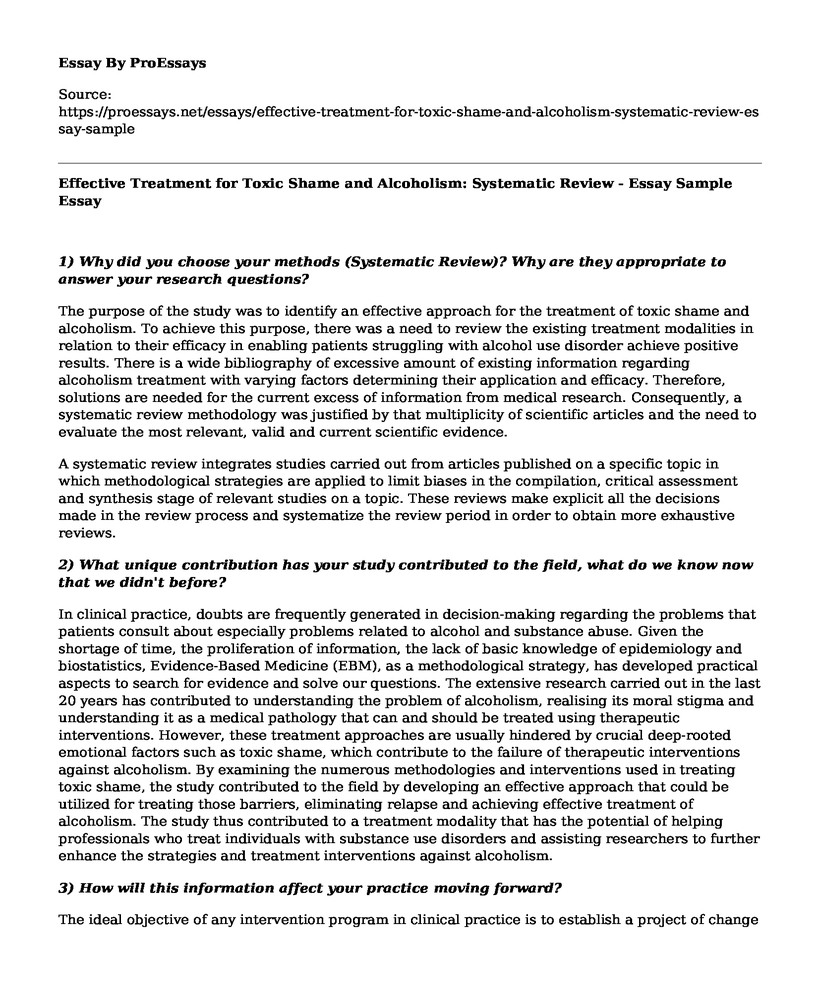1) Why did you choose your methods (Systematic Review)? Why are they appropriate to answer your research questions?
The purpose of the study was to identify an effective approach for the treatment of toxic shame and alcoholism. To achieve this purpose, there was a need to review the existing treatment modalities in relation to their efficacy in enabling patients struggling with alcohol use disorder achieve positive results. There is a wide bibliography of excessive amount of existing information regarding alcoholism treatment with varying factors determining their application and efficacy. Therefore, solutions are needed for the current excess of information from medical research. Consequently, a systematic review methodology was justified by that multiplicity of scientific articles and the need to evaluate the most relevant, valid and current scientific evidence.
A systematic review integrates studies carried out from articles published on a specific topic in which methodological strategies are applied to limit biases in the compilation, critical assessment and synthesis stage of relevant studies on a topic. These reviews make explicit all the decisions made in the review process and systematize the review period in order to obtain more exhaustive reviews.
2) What unique contribution has your study contributed to the field, what do we know now that we didn't before?
In clinical practice, doubts are frequently generated in decision-making regarding the problems that patients consult about especially problems related to alcohol and substance abuse. Given the shortage of time, the proliferation of information, the lack of basic knowledge of epidemiology and biostatistics, Evidence-Based Medicine (EBM), as a methodological strategy, has developed practical aspects to search for evidence and solve our questions. The extensive research carried out in the last 20 years has contributed to understanding the problem of alcoholism, realising its moral stigma and understanding it as a medical pathology that can and should be treated using therapeutic interventions. However, these treatment approaches are usually hindered by crucial deep-rooted emotional factors such as toxic shame, which contribute to the failure of therapeutic interventions against alcoholism. By examining the numerous methodologies and interventions used in treating toxic shame, the study contributed to the field by developing an effective approach that could be utilized for treating those barriers, eliminating relapse and achieving effective treatment of alcoholism. The study thus contributed to a treatment modality that has the potential of helping professionals who treat individuals with substance use disorders and assisting researchers to further enhance the strategies and treatment interventions against alcoholism.
3) How will this information affect your practice moving forward?
The ideal objective of any intervention program in clinical practice is to establish a project of change in the patient's lifestyle by facilitating the mechanisms and skills necessary for that change to occur. Most of the individuals who decide to make an attempt to stop using psychoactive substances have made other attempts, either by themselves or with help, to come to the programs with the desire to get out of the problem and consumption situations. However, in in most cases, their predisposition towards general drug use remains positive added to the pre-existing reasons that initially drive them to abusing the toxic substance. The mostly applied cognitive behavioral treatments strive to develop coping skills, restore self-efficacy, and create more constructive attributions by attributing their setbacks to external causes. In recognizing toxic shame as a critical internal barrier to treatment, my future practice will pay attention to the deep rooted emotional factors while attributing the success of treatment to internal factors.
4) If you had unlimited time/resources how would you have done this study? Or going back is there anything about your study you would do differently now that you know what you know?
While a systematic review methodology presented a more valid and detailed understanding of the problem, the many relevant studies presented the risk of misinterpretation and the possibility of unintentionally overlooking them due to factors such as time, resources, and financial constraints. With adequate time and resources, the study would incorporate an experimental approach using participants to identify, analyze and discuss with the individuals the possible difficulties and setbacks that could hinder the proper evolution of their problems.
Cite this page
Effective Treatment for Toxic Shame and Alcoholism: Systematic Review - Essay Sample. (2023, Jul 20). Retrieved from https://proessays.net/essays/effective-treatment-for-toxic-shame-and-alcoholism-systematic-review-essay-sample
If you are the original author of this essay and no longer wish to have it published on the ProEssays website, please click below to request its removal:
- Paper Example on Unconscious Biases
- Memory, Bias and Heuristics, Human Development Paper Example
- Scarlet Ibis and Brownies Essay Example
- Stalking and Domestic Violence Essay Example
- Sexualization of Women in American Culture Essay Example
- Jack Johnson: The Challenges of Being the First Black World Heavyweight Champion - Essay Sample
- Essay Example on Sex Offender Management: Prevention and Intervention Techniques







